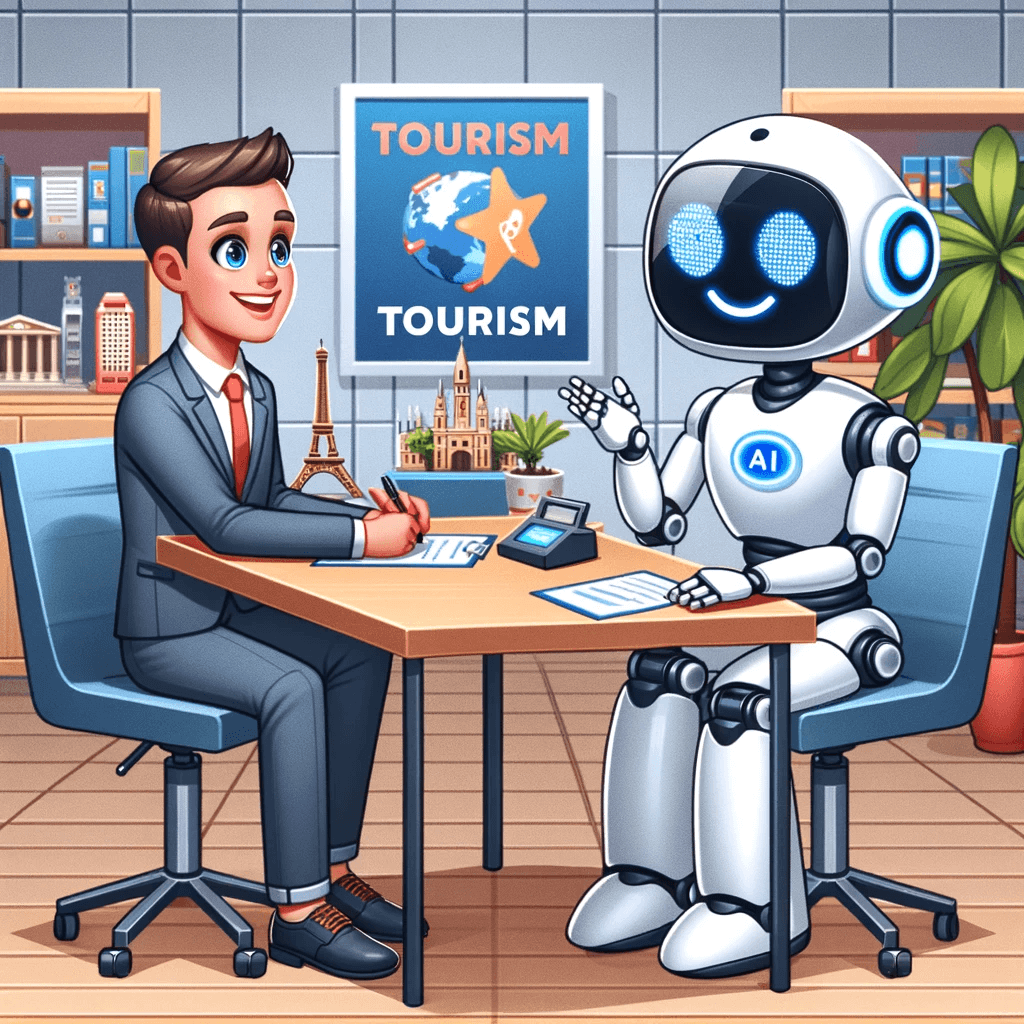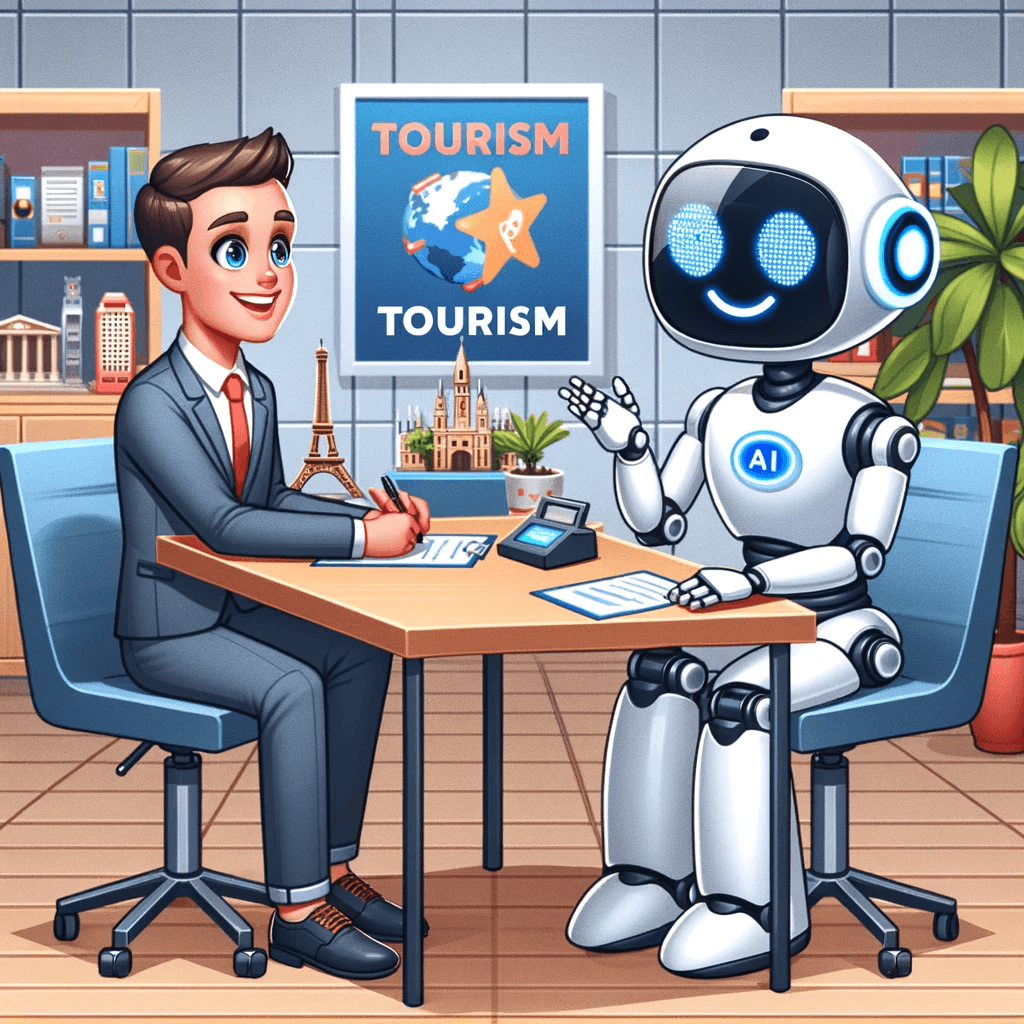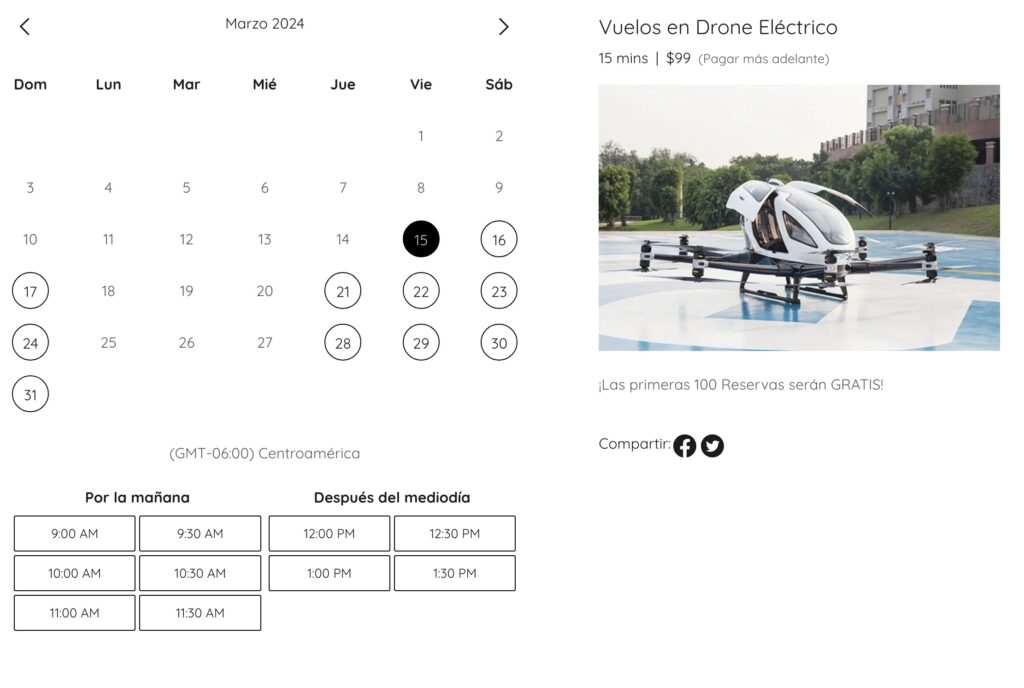
10 questions to ask candidates in an AI tourism job interview
February 13th, 2024
by Alex Bainbridge
I am thinking about hiring. Not actually hiring, but thinking about hiring.
So with that in mind, I have pulled together some questions that I could ask in a job interview. The more senior you expect to be, the more of these questions I expect you to be able to give a good answer to.
Mostly it is the founders job to set overall & product strategy, so failing to answer all of the questions is not a bad outcome, it is all about initial reactions to new problems and being able to think through from first principles.
Also, really, I need to hire a junior customer success destination storyteller (remote) not a senior AI product manager / strategist…. but that doesn’t make such a good blog post 😉
I will followup next week with some proposed answers.
1) AI enabled personalisation
Read these quotes:
Peter Kern, CEO, Expedia
AI, Personalization – which I think is the next frontier really for travel and I think we are leading in it and will lead in it
Source: https://www.youtube.com/watch?v=EDXK2pFphAs
Sarah Dines, Commercial, Viator
Sort order is key,and as personalization gets better, we can surface more relevant products for the marketplace.
Source: https://www.webintravel.com/is-this-the-moment-for-audio-tours-viators-dines-not-prepared-to-call-it-yet/
Nils Chrestin, CFO, GetYourGuide
Consumers will increasingly migrate towards trusted and authentic digital platforms to discover and learn more about a location, such as content from trusted influencers and verified customer reviews. They will also expect more personalized travel options that make their planning process less fragmented and more flexible, in case their plans change
Source: https://www.phocuswire.com/experts-travel-predictions-generative-ai-sustainability-distribution
- What do they mean by personalisation?
- What can Expedia/Viator/GetYourGuide personalise WITHOUT involving their tour & attraction suppliers?
- What can tour & attraction suppliers personalise WITHOUT involving the OTA retail layer?
- What could they personalise together if the OTA retail layer worked with the tour & attraction suppliers? What does the reztech layer need to change in order to enable connected OTA / supplier personalisation?
2) AI driven transport
Electric autonomous vehicle experiences are now bookable online in Guatemala. See https://eaelectricaviation.com/
(Autonomous means no pilot)

The autonomous eVTOL price is 99 USD for two people, vs (approximately) 250 USD for two people in a piloted helicopter for the same duration.
- What is your advice to Maverick Helicopters for their long term vehicle strategy in the AI era? Should they stick with piloted helicopters or transition to autonomous eVTOL vehicles? (eHang 216-S is 410,000 USD)
- Are there any wider lessons that tour bus operators should be considering with regards to the imminent widespread autonomous land based tourism vehicles?
- When you no longer have a driver / pilot, how do you continue to operate tourism & hospitality experiences beyond the vehicle driving function? For example acting as a sightseeing guide or answering questions about where the nearest restroom is
3) AI enabled itinerary design
I assume you have used ChatGPT.
- Imagine asking for “how to spend a tourist afternoon in London”. What is good and what is bad about what ChatGPT replies with?
- As we move from premade products (like tour itineraries) to design your own experiences, what does it mean for retailers & suppliers when we have infinite variations of product? What are the challenges to operating these experiences commercially?
4) AI agents / AI assistants / AI tour guides
My 2024 definition, within the tourism context, is:
AI tour guide – guides you for the 3 hours you are on a food tour
AI assistant – helps you for the 7 days you are in a destination
AI agent – acts on your behalf, based on your known preferences. For example might tell a restaurant you are going to be 30 minutes late, if you are running late on your tour. AI tour guides & AI assistants can be AI agents, or may not be
- If you are a tour operator, which of these three concepts is the most useful?
- If you are an OTA retailer, which of these three concepts is the most threatening to the existing industry business model you dominate today?
5) AI tour guides
Sarah Dines, Commercial, Viator
The thing that makes audio guides great is the right storyteller and the compelling story. I don’t think AI is in a position to tell stories. For example, there’s a tour of the USS Arizona Memorial where the late actor Ernest Borgnine narrates the history and recounts the day of the bombing of Pearl Harbor – that kind of authenticity cannot be replaced by AI
Source: https://www.webintravel.com/is-this-the-moment-for-audio-tours-viators-dines-not-prepared-to-call-it-yet/
- What is the difference between an AI tour guide and an audio tour?
- Is Sarah Dines right? Discuss
6) Consumer mindset
According to Phocuswright’s latest travel research report GenAI and Emerging Tech Use Among Travelers, nearly half of travelers would be comfortable in a chatbot interaction where they provide their trip preferences and the AI platform offers a range of recommendations. French and German travelers were the least likely to be comfortable with this application.
Source: https://www.phocuswire.com/phocuswright-travelers-comfort-using-generative-artificial-intelligence-for-travel
- What is the difference between a chatbot and a voice user interface?
- How do you predict consumer mindset might change over time?
7) Marketing & Distribution
- What is the right price for an AI tour guide? Should they be free (like Google Maps), or the same price as human tour guides? Or?
- If in the long term AI tour guides become free (like Google Maps), how do you market & distribute that? Who wants to distribute a free product?
- What could the role be for AI influencers / AI girlfriends / AI boyfriends at the top of the industry distribution funnel?
8) AI technology standards
OCTO is prioritising 3 areas for 2024 for cross-industry standardisation:
- Content – e.g. tour descriptions
- Hotel pickups – how guests are pickedup from their hotel prior to their tour
- Webhooks – a communication mechanism between industry layers
- What could OCTO be standardising that supports personalisation?
- What are benefits of technology standards? What are the negatives?
9) Not AI
In the last 30 years we have seen 3 main technology shifts:
Web – ecommerce / direct bookings
Mobile – which motivated the scale up of reztech as then all OTAs needed live availability & bookability
Social – with reviews
- If AI is not the next big impactful tech in the sightseeing & experiences sector, what else could be?
- How will AR/VR/Metaverse impact tourism?
- How will decentralised web protocol enabled tech such as digital wallets and self-sovereign identity impact tourism?
10) How do you stay current with AI trends?
- What do you read online? What AI or tech podcasts do you listen to?
- How do you like reading Alex’s long blog posts? (only kidding!)
I will followup next time with a blog post with my 10 answers! So do subscribe so you are notified when that happens…… https://www.destinationcto.com/about/subscribe/
Catch Alex Bainbridge speaking next (early 2024)
- Travel Trends AI summit (virtual) – Speaking Wednesday 21st February about AI tour guides
- Arival Berlin – Hosting a discussion about AI / AI tour guides – Sunday 3rd March – Breakout Session II
- ITB Berlin – Speaking about autonomous vehicles – land and eVTOL – Wednesday 6th March 11:30 – 12:00 – Hall 6.1 eTravel Stage (AI is coming for your tour bus)
Image: Dall-E

This content is protected by copyright. Link sharing is encouraged but duplication and redistribution is illegal


If you prefer to comment on LinkedIn, here is the thread https://www.linkedin.com/posts/alexbainbridge_10-questions-to-ask-candidates-in-an-ai-tourism-activity-7163179900072374273-LHf8